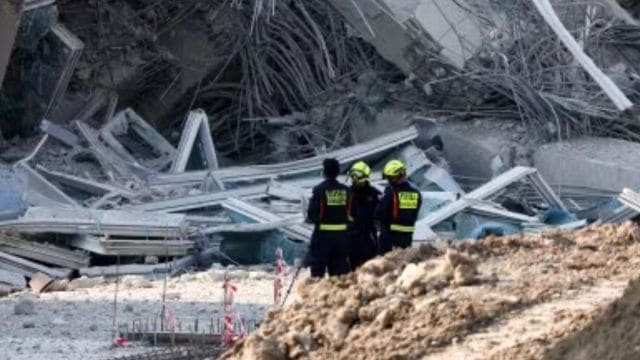Opinion Myanmar earthquake: Can the military junta be trusted with foreign aid?
Instead of focusing on secure-and-rescue efforts to find survivors, the regime conducted airstrikes immediately after the calamity
 Any entity managed by the regime is unlikely to disburse such assistance fairly. (File)
Any entity managed by the regime is unlikely to disburse such assistance fairly. (File) The recent earthquake of 7.7 magnitude that hit a long section of the Sagaing Fault in Myanmar, which was felt by neighbouring countries, was one of the most devastating natural disasters the region has experienced in recent years. The US Geological Survey (USGS) has suggested that the death toll could exceed 10,000 people based on their modelling. The military junta, however, is not expected to give precise figures of casualties whenever natural disasters take place, undermining the full extent of the suffering of victims. Although the regime made a rare outreach for international support and imposed a state of emergency, it did not prepare a proper disaster response and mitigation plan.
The ongoing civil war in Myanmar has increased the country’s vulnerability to climate change and other disasters. Major cultivation areas such as the Dry Zone and the Irrawaddy Delta are the most susceptible to climate-related calamities in the country. The junta halted conservation programmes and weakened public institutions, disaster governance and urban planning following the 2021 coup. Moreover, the intensification of conflict and ineffective leadership have allowed rogue companies to conduct exploitative projects damaging to the environment.
The junta and its cronies and affiliates have a legacy of weaponising aid. This ranges from obstruction of assistance or keeping it for certain groups. Relief actors have been urged to reassess how it is allocating aid and not simply rely on the military government. Any entity managed by the regime is unlikely to disburse such assistance fairly. Even local actors have claimed that insufficient aid is delivered to the communities at risk.
The State Administration Council (SAC) has a history of poor emergency management and appropriating life-saving equipment during crises such as the Covid pandemic. It allegedly hoarded medical supplies, such as oxygen cylinders, which led to widespread panic and long queues during the lockdown. Concerns were also raised when Thailand’s humanitarian initiative in 2024 sought to cooperate with the Myanmar Red Cross to provide aid packages to internally displaced persons (IDPs) in Karen State. The latter organisation is an entity separate from the International Committee of the Red Cross (ICRC) since it is managed by the junta and is part of its security apparatus.
The ICRC’s code of conduct, taken from the 1949 Geneva Conventions and the 1977 Additional Protocols, requires consent from all parties before conducting relief efforts. Even though the SAC lacks legitimacy to rule Naypyidaw, the UN and major humanitarian actors continue to engage it by entering memorandums of understanding and complying with its requirements. While being non-political and neutral in protracted conflicts has normative value, it is not always the most practical intervention when violations are being perpetuated by the ruling actor.
Relief agencies need to go beyond traditional frameworks of aid distribution by working with a wide range of local providers to ensure that aid reaches those greatly affected by the recent earthquake. Smaller, community-led humanitarian groups that have received cross-border aid from Thailand and India have started supporting local communities. Their vast network has reached not only the borderlands but also the Dry Zone, such as Magway, Sagaing, Mandalay and Bago. Despite facing bureaucratic, operational and political challenges, aid workers present in the most precarious areas continue their activities to protect, support and uplift human life in every way possible.
most read
Approximately 15.2 million people in the country were already facing food insecurity before the earthquake. The lack of water and prolonged dry spells have greatly impacted the agricultural sector, farmers and their livelihoods. The earthquake has worsened the ongoing humanitarian crisis caused by the civil war in Myanmar. Instead of focusing on secure-and-rescue efforts to find survivors, the regime conducted airstrikes immediately after the calamity, further underscoring that the state has intentionally committed grave violations and does not have the mandate to be rightful recipients of foreign assistance.
Roshni Kapur is a doctoral student at the University of Ghent, focusing on caste and land conflicts. She specialises in identity politics, transitional justice, post-war reconciliation, domestic and party politics of South Asia. Amit Ranjan is a Research Fellow at the Institute of South Asian Studies, NUS, Singapore





